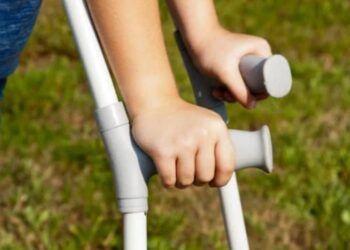The Easter break is a great opportunity to enjoy the outdoors with family and friends and the UK Health Security Agency (UKHSA) South West encourages people to enjoy the countryside during springtime, especially engaging in physical activity which has a positive impact on your health and quality of life.
To get the best out of the holiday period and keep safe, UKHSA South West is reminding people to take a little extra care to avoid becoming unwell.
At this time of year, we typically see an increase in gastro-intestinal infections such as cryptosporidium and E.coli associated with these activities, including farm visits.
Cryptosporidium is a parasite that can be found in soil, water, food or on any surface that has been contaminated with human or animal faeces.
The symptoms of cryptosporidiosis are typically watery diarrhoea and stomach pains. There is no specific treatment for the illness which is usually self-limiting, although it is important that anyone with the illness keeps hydrated.
Cryptosporidium is only one of a number of bugs that can be picked up during a visit to a petting farm. Other common infections are caused by E. coli and Salmonella.
All of these bacteria live in the gut of the animals so people can get infected within the farm setting mainly in two ways – either by touching animals in the petting and feeding areas or by coming into contact with animal droppings on contaminated surfaces around the farm.
These harmful bacteria can get accidentally passed to your mouth by putting hands on faces or fingers in mouths before washing them thoroughly. It only takes a small number of the bacteria to cause infection.
Cases of E. coli linked to farm attractions are at their highest levels between June and October. An infection with E.coli can lead to mild gastrointestinal illness or in serious cases it can cause bloody diarrhoea which can lead to severe illness.
We know that having the right handwashing facilities at the right height and in the right place is particularly important to encourage handwashing in children. The best farms in the South West have facilities based in a practical place and hot water and soap readily available.
And to make it easier down on the farm to time how long you have washed your hands for, simply recite a single verse of nursery rhyme favourite Old Macdonald which takes around 20 seconds, children should always be supervised when washing their hands as they are more at risk of serious illness.
It’s also important to be aware that the birthing season for sheep and goats runs from January – May, so if you are pregnant and visiting a farm during the Easter holidays, it’s important to remember to avoid close contact with sheep and goats. Some infections can be passed from goats and sheep to humans, and if a pregnant woman becomes infected, it could harm her and the unborn child.
As we move into spring and summer, ticks also become more active and the risk of tick bites and Lyme Disease increases. To reduce this risk consider covering your arms and legs and using insect repellent when out walking. When you have been out, carefully check yourself, your clothing, and any pets you have taken out, and remove any ticks if you find them.
Dominic Mellon, Deputy Director of Health Protection for UKHSA South West said:
“Visiting a farm is an enjoyable and educational experience for many people, particularly children. However, visiting a farm carries a small risk of catching infection from animals or the environment.
“Farm animals can be the source of several bugs that can be passed from animals to humans and cause illness. Some can be particularly serious for children or pregnant women.
“Infection can be picked up from the animal’s body, its poo or from areas where animals have recently been. If the germs are on your hands, you could accidentally pass them to your mouth. You can’t see the germs, so your hands may appear clean.
“Washing your hands thoroughly with soap and hot water immediately after you have had contact with animals will reduce the risk of infection. Hand gels or wipes are not a substitute for washing your hands with soap and running water although they are better than nothing if soap and running water is not available.”
What to do when visiting a farm
Following the simple rules listed below will help to keep you and your children safe from infections that may be found on open farms. Pregnant women need to take particular care as infections acquired from animals can be harmful to them and their unborn baby.
– Do wash your hands thoroughly with soap and water after you have touched animals, fences or other surfaces in animal areas.
– Do wash your hands thoroughly with soap and water before eating or drinking.
– Do remove and clean boots or shoes that might have become soiled and clean pushchair wheels. Then wash your hands thoroughly with soap and water.
– Do supervise children closely to ensure that they wash their hands thoroughly.
– Do eat and drink in picnic areas or cafes only.
– Do not put hands on faces or fingers in mouths while petting animals or walking round the farm.
– Do not kiss farm animals or allow children to put their faces close to animals.
– Do not eat or drink while touching animals or walking round the farm. This includes not eating sweets, crisps or chewing gum.
– Do not eat anything that has fallen on the floor.
– Do not use gels or wipes instead of washing hands with soap and water. Gels and wipes do not remove bugs in dirt.
If you are planning a school or group visit to a farm, you also need to make sure that you’ve considered all the risks and taken steps to manage them. Guidance is available to help schools and teachers do this.
For more local news scroll down or click here.

You can join us on our social media pages, follow us on Facebook or Twitter and keep up to date with whats going on in South Devon.
Got a news story, blog or press release that you’d like to share or want to advertise with us? Contact us


























